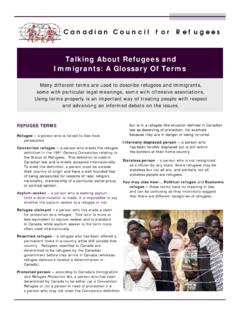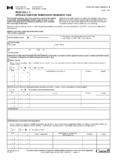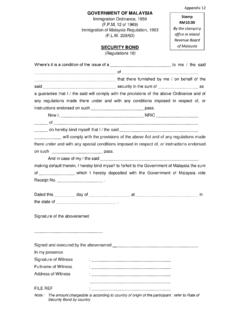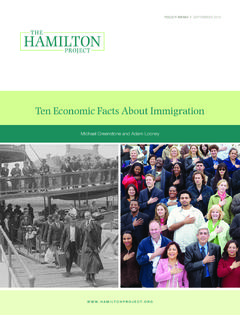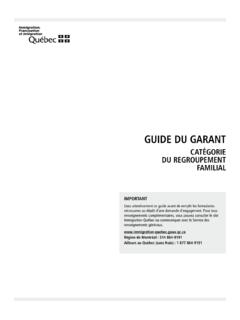Transcription of CANADIAN COUNCIL FOR REFUGEES THE UNITED …
1 CANADIAN COUNCIL FOR REFUGEES THE UNITED CHURCH OF canada INTERNATIONAL BUREAU FOR CHILDREN S RIGHTS The understanding and application of Best Interests of the Child in H & C decision-making by Citizenship and Immigration canada September 2008 Table of Contents 1. Introduction .. 2 2. Parameters of the obligation to consider BIC in the H & C context .. 3 a. International Law .. 3 b. CANADIAN Law .. 4 c. CANADIAN Jurisprudence .. 4 d. Departmental Guidelines .. 6 3. Concerns over canada s respect for its obligations .. 8 4. Analysis of H & C 9 a.
2 Examples of BIC determinations in positive H & C decisions .. 9 b. Analysis of some recent negative H & C decisions involving BIC .. 10 5. Conclusion and Recommendations .. 17 2 1. Introduction This report has been produced by the CANADIAN COUNCIL for REFUGEES , the UNITED Church of canada and the International Bureau for Children s Rights in order to provide observations on how the notion of best interests of the child (hereinafter BIC) is being interpreted and applied within the context of inland and overseas applications for permanent residence on humanitarian and compassionate grounds (H & C applications), as well as recommendations for improvement.
3 In so doing, this report provides a partial update to the CCR s 2004 report Impacts on Children of the Immigration and Refugee Protection Act. As much as possible, in the present report, we have illustrated our concerns with reference to actual H & C decisions. As we point out below, we are aware that many good decisions have been rendered by immigration officers who have demonstrated genuine sensitivity and understanding regarding children s interests. However, we remain troubled by a number of issues in negative decisions which we believe represent persistent problems in the understanding and application of the BIC by many immigration officers.
4 We will begin with an examination of the parameters (ie. the content) of the obligation of immigration officers to consider BIC within the H & C context, followed by a review of some concerns expressed about canada s respect for that obligation. Then we will provide an analysis the BIC determinations of a number of recent H & C decisions, and conclude with our recommendations. H & C decisions are critically important for children, as they represent in some circumstances the only provision in the immigration legislation to allow them to reunite or remain with family members, including parents.
5 H & C decisions also determine whether some children will live in canada or in another country where their rights may be compromised. The following are some of the situations where children s rights depend on an H & C decision: Separated refugee children in canada trying to reunite with parents and/or siblings. Children have no right in the law to apply for family reunification, and so must depend on an H & C application made by their parents or siblings. Excluded family members (R. 117(9)(d)). Children must rely on H & C for family reunification if they or their family members are excluded family members , they were not examined by a visa officer when the sponsor immigrated to canada .
6 Deportation. Some children face deportation to a country where their rights and well-being may be at risk if they are not granted a positive H & C. Deportation of a parent. Some H & C decisions concern a parent who is threatened with deportation. If H & C is refused, the child in canada will likely be separated from the deported parent. Nationals of moratoria countries. Nationals of moratoria countries who are not recognized as REFUGEES are allowed to remain in canada but must rely on an H & C application to obtain permanent residence.
7 Children are affected both when they are part of the family in limbo in canada (even if they themselves have citizenship by birth in canada ) and when they are overseas and deprived of the opportunity for family reunification until their parent in canada has permanent residence. 3 2. Parameters of the obligation to consider BIC in the H & C context The basis of the obligation of immigration officers to consider the BIC in the context of H & C decisions, and the content of that obligation, is derived from four sources: International Law, CANADIAN Law, CANADIAN Jurisprudence and Departmental Guidelines.
8 A. International Law The Convention on the Rights of the Child, to which canada is a signatory, is the leading international human rights instrument on children s Article 3 of the Convention establishes the principle of the best interests of the child . Article 3 1. In all actions concerning children, whether undertaken by public or private social welfare institutions, courts of law, administrative authorities or legislative bodies, the best interests of the child shall be a primary consideration. The rest of the Convention is largely an explanation of how the best interest of the child applies in different contexts.
9 Of particular relevance to the CANADIAN H & C context are the following obligations: - Not separating children from their parents (Art. 9 States Parties shall ensure that a child shall not be separated from his or her parents against their ) - Family reunification (Art. 10 applications by a child or his or her parents to enter or leave a State Party for the purpose of family reunification shall be dealt with by States Parties in a positive, humane and expeditious ) - Child s right to be heard (Art. 12 States Parties shall assure to the child who is capable of forming his or her own views the right to express those views freely in all matters affecting the ) It should be noted that Section 3(3)(f) of the Immigration and Refugee Protection Act (IRPA) provides that: (3) This Act is to be construed and applied in a manner that [.]
10 ] (f) complies with international human rights instruments to which canada is signatory. Further, the Federal Court of Appeal has clarified that unless there is a clear legislative intent to the contrary, the provisions of IRPA must be applied in a manner consistent with the international human rights instruments to which canada is a signatory: 1 Children s rights are also, of course, guaranteed by other international instruments, including the International Covenant on Civil and Political Rights, the International Covenant on Economic, Social and Cultural Rights and the Convention on the Elimination of All Forms of Discrimination against Women.
